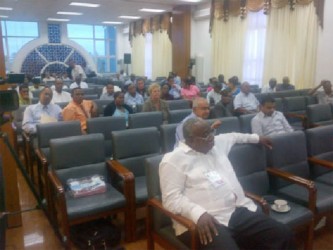First Secretary in the Chinese Embassy in Guyana, Jason Zhang yesterday urged Guyanese businessmen to exercise more diligence when trading with suppliers in China to avoid becoming victims of fraud.
The caution came during his presentation at yesterday’s Business Development Forum held by the Guyana Manufac-turing and Services Associa-tion (GMSA) ahead of the opening of GuyExpo 2013.
Several stakeholders from different sections of the Guyanese business community as well as members of the international business community attended the Forum to hear presentations of strategies aimed at making their ventures more successful.
Bilateral trade between Guyana and China jumped from US$147 million in 2011, to US$226 million in 2012, Zhang said. This figure represents an increase of 53%, and with Guyana’s economy continuing to grow at around 5% each year, Zhang said that he expects trade to increase even more in the coming years. But with the increase in trade, there have also been an increased number of trade disputes, particularly where businessmen claim to have been defrauded by suppliers of fake products. The situation is not helped by the fact that many of these businessmen transact their business with the professed supplier via the internet rather than travelling to China to make the transaction in person.

Zhang said that much of the information provided on the websites of Chinese entities looking to defraud unsuspecting businessmen is unreliable.
Therefore, Zhang told the gathering, one of the ways to avoid falling victim to such schemes is to ensure that the sites they use to shop online are reliable. One such site, he said, is cantonfair.org, which has been verified by Chinese officials and contains a wide variety of items that the average businessman would be looking for.
Persons making large orders are advised to try as much as possible to go, or at least send a representative to China so as to ensure that the transaction they are making with an entity is valid. Businessmen might be deterred by the amount of time it takes to travel to and from China, as well as the cost to facilitate the travel, but Zhang said that the satisfaction of being assured that the transactions made are valid would be worth the investment of time and money.
Smaller businesses looking to procure items from Chinese suppliers were urged to execute their transactions through a trusted agent on the ground in China and who has been verified as reliable.
Businessmen involved in all scales of operations were also urged to contact the Guyanese Embassy in China, which might be able to provide information as it relates to the reliability of firms with which they might be looking to trade. The Chinese Embassy in Guyana is also open to providing certain services to Guyanese businessmen.
Advance payment
Businessmen were also warned to stay clear of sites which request advanced
payments before the items they are looking to buy are shipped. According to Zhang, requests for advanced payments of varying amounts have been made in 90% of the fraud cases reported by Guyanese businessmen.
“Many were asked to make advanced payments and they did so. That is a very dangerous thing,” he told the stakeholders, which included several Guyanese businessmen who said that they sourced goods from Chinese suppliers from time to time.
It should be noted that not all of these requests are fraudulent. One businessman shared his experience of having procured items from a Chinese supplier over several years. In each of his transactions, he told his fellow businessmen, he was asked to make advance payments on the items he had requested. He said that he paid the advance on each occasion and always received the goods he had bought.

Despite this testimony though, another businessman was still not fully convinced. In his quest to find food processing equipment, the man said, three of the six companies he approached asked him to pay an advance of 30% on the items he was looking to procure.
Zhang said that while some legitimate companies may have valid reasons for requesting advances, it is still not a safe practice, and he urged businessmen to instead seek out opportunities to conduct Documents against Payment transactions.
In this way, suppliers can be issued with a letter or credit as opposed to cash. This assures the supplier that the buyer is serious, and gives the businessman the guarantee of the shipment of his goods before he is required to pay.





